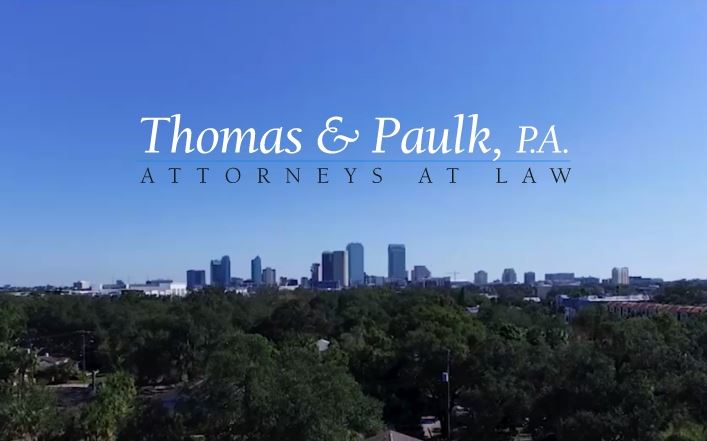
As Tampa theft crime defense lawyers with more than 40 years of collective experience, including time as former prosecutors, we know what it takes to effectively challenge all types of Florida theft charges.
Tampa Theft Crime Attorneys
Experienced Theft Crime Defense in Florida
If you have been arrested for a theft crime — whether it was armed robbery, fraud, identity theft, burglary or grand theft auto—you need to have an aggressive attorney in your corner dedicated to protecting your rights. The penalties associated with theft crimes can be severe, and you will want someone who knows the laws and knows the best ways to protect you against a conviction.
By working with Thomas & Paulk, you can benefit from several things:
- 40+ years of combined legal experience
- Experience handling 7,000+ cases
- Personalized attention
- Free consultation
No matter whether a person has been charged with a misdemeanor or felony theft crime in Florida, it is always in their best interest to obtain the services of a knowledgeable criminal attorney. An attorney can investigate and negotiate with judges and prosecutors to possibly have the theft crime charges reduced, or in some cases, dismissed entirely.
What Is a Theft Crime?
Theft occurs when a person steals another person’s property without their knowledge or permission. Theft crimes tend to range in severity, from non-violent misdemeanor offenses to serious and/or violent felony offenses. The type of offense is usually determined by the value of the property and how it was allegedly taken.
For example, if a person allegedly stole property valued at or below $500, they would be charged with a misdemeanor. If they took a certain type of property, property valued above $500, or used violence or force to commit the offense, they would be charged with a felony in Florida.
Challenge Your Tampa Theft Charges
Beyond holding the position that you were not knowingly in possession of the stolen goods or that you had reason to believe they belonged to you, a criminal defense attorney can work to reduce the charges from felony theft to misdemeanor theft, which carries fewer penalties.
Contact a Tampa theft crime attorney for your free consultation!
Experience Counts
As former prosecutors, our founding attorneys understand how the “other side” thinks and works. We use this to our clients' advantage when we take on their theft crime cases, fighting for the best possible results no matter the odds or challenges we may face.
Grand Theft vs. Petit Theft in Tampa, FL
Florida Petit Theft Penalties
More "minor" thefts are typically classified as petit thefts. However, just because it is called minor does not mean that they are not serious. The penalties for these crimes are still severe. Per Florida Statutes, a petit theft of the first degree occurs when the property taken is valued between $100 and $300 or if the defendant has a prior theft conviction on their criminal record. Most instances of shoplifting are charged as petit theft crimes.
This is a first-degree misdemeanor, punishable by:
- Imprisonment not exceeding a year; and
- Monetary fine not exceeding $1,000.
If the item is valued at less than $100, it is petit theft of the second degree. This is a second-degree misdemeanor, which can be punishable with up to 6 months in jail and a fine that does not exceed $500. Due to these penalties, it is extremely important that you contact our firm as soon as possible for help in protecting your rights against an unjust conviction.
Understanding Grand Theft Charges
When the item taken is particularly valuable, it is generally categorized as grand theft. A defendant may face first-degree grand theft charges, for example, if accused of taking property valued at $100,000 or more or taking shipping cargo valued at $50,000 or more. These charges may also apply to committing a grand theft while using a motor vehicle as an instrument other than as a getaway car or committing a theft that results in damage to real estate or personal property of more than $3,000.
Grand theft is a first-degree felony, punishable by the following:
- Imprisonment not exceeding 30 years; and
- Monetary fine not exceeding $10,000.
Grand theft of the second degree can be charged if the defendant is accused of taking property valued between $100,000 and $20,000, shipping cargo valued at less than $50,000, or emergency medical equipment valued at more than $300 from a licensed facility. It can also be charged for taking law enforcement equipment from an authorized emergency vehicle, when this equipment is valued at more than $300.
Grand theft of the third degree can be charged when the property taken was valued between $300 and $20,000; was a will, codicil, or testamentary instrument; was a firearm of any kind; a motor vehicle, as in grand theft auto; or a commercially farmed animal. It can also include the theft of fire extinguishers, 2,000 or more pieces of citrus fruit, theft from a construction site, a stop sign, anhydrous ammonia, or certain controlled substances.
Shoplifting / Retail Theft
In addition the penalties listed for petit theft, a person accused of retail theft could be on the hook for civil penalties too. This could mean being ordered to pay $200 or three times the amount of what was stolen in addition to paying for the alleged victim's attorney fees. This would be in addition to any criminal fines placed on the accused.
If someone is accused of using or even just trying to implement an anti-shoplifting device in a retail store, they could be charged with a felony of the third degree (up to 5 years in prison and a $5,000 fine).
Dealing in Stolen Property
This theft offense can be charged as a felony of the second degree, which could mean a 15-year prison sentence and $10,000 fine. If the alleged offense involved being the one to initiate, plan, support, manage, and/or oversee the commission of the theft and trafficking of property, then the charge could be a felony of the first degree (up to 30 years' prison).
Carjacking
Under Florida Statute 812.33, carjacking is a felony of the first degree. If a deadly weapon was not used during the carjacking, then sentencing could still mean up to 30 years in prison and being fined $10,000. If a deadly weapon such as a firearm was involved, then a conviction of carjacking could lead to a life sentence in prison.
Defending Theft Crime Charges in Tampa
Even complex theft crime cases may be won. For example, we could argue that the property was "valueless," that you were a co-owner, that you were acting on good faith that you were the rightful owner, or any other number of defense strategies.
Some possible theft crime defense include proving:
- Lack of Intent: Argue that there was no criminal intent involved, or perhaps that you were intoxicated when the theft occurred and that there was therefore no intent
- Entrapment: You were goaded into committing the theft by an undercover police officer, or you were unaware that certain items were stolen.
- Overvalued Property: You could get a felony reduced to a misdemeanor by proving that the amount stolen was artificially inflated and is actually below the amount that turns a theft crime into a felony.
- Consent: In certain circumstances, it can be established that you had the owner's consent, or that you were under the reasonable belief that you had the owner's consent.
These are just a few general strategies for various theft cases. There may be several other approaches to take in your particular case. When you need a tailored defense for a tough theft charge, you can rely on Thomas & Paulk. We have personally handled 7,000+ criminal cases throughout our more than 40 years of collective legal experience. We know how to find the right defense strategy for each client.
Call (813) 221-4200 today or contact us online to request your free defense consultation!
-
We personally handle your defense strategy.
Our lawyers have been helping people just like you defend their future for decades.
View Results -
We always put our clients' cases and needs first.
Read our reviews to see what it is like working with our Tampa criminal defense law firm.
See Success Stories -
We're ready to hear your side of the story.
Tell us what happened to you during a completely free and confidential consultation.
Contact Us



